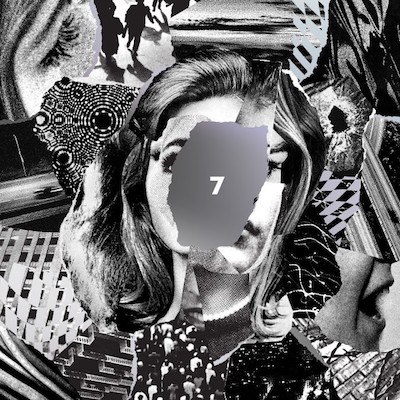
Secret Meeting score: 97
by Joey Cobb
7 is a number shrouded in a history of symbolism, spirituality and superstition. In Japanese folklore it is considered lucky and many religions consider it significant, often linking it to divinity and wholeness. In a set of Tarot cards, the seventh is the card of the Chariot, coincidentally the name of Beach House’s one off single in support of last year’s B-Sides and Rarities collection. It’s fair to say that mystical forces have been present throughout the existence of the group. Super-fans on Reddit have ruminated at length about patterns and codes that have emerged throughout the band’s career, like the fact that the first letters of their first six albums spell out ‘BDTBDT’. Or the spooky coincidence (?) that their latest album’s release numbers on both Sub Pop and Bella Union somehow add up to seven. Since emerging from the slow sepia warmth of their self-titled debut just over a decade ago, the enigmatic Victoria Legrand and Alex Scally have let fate, feeling and artistic spirituality direct their band’s direction and growth. It seems perfectly fitting then, for them to name their seventh album, 7.
The limitations that Legrand and Scally choose to work under have resulted in a remarkable consistency from one album to the next, underpinned by classic song writing and always delivered with genuine feeling. The Beach House sound is like a dense sonic painting layered with saturated thrift shop organs, shiny arpeggiating guitars and sputtering prehistoric drum machines all swirling steadily around Legrand’s breathy, androgynous vocals. Long time fans will be relieved to hear this sound still at the core, but what is exciting about 7 is that this formula is being pushed much further than it ever has before. Synths mutate and jump out of the compositions, the guitars retreating in among them before emerging wailing and dissonant at times, unexpected but beautiful. The steady drum machine grooves pattering at the heart of Lemon Glow and Woo wouldn’t sound out of place on an old-school hip hop track, but amid the kaleidoscopic instrumentation and hushed vocals, they introduce a cosmic freshness.
This shift in sound is largely due to a change in production duties. Long time co-producer and mixer Chris Coady has helped sculpt the glistening darkness of the band since 2010’s Teen Dream, but on 7 it is Pete ‘Sonic Boom’ Kember of Spacemen 3, who has seemingly unshackled the duo from their own constraints, encouraging a deeper exploration of what the Beach House sound can actually be.
The slurry of tom drums ushering in opener Dark Spring bursts into a driving syncopation, announcing a new energy that goes on to contort and transform throughout the album. Legrand’s layered whispers breathe in and out of Scally’s emotive, squalling guitar, cloaking you in a veil of velvet reminiscent of the gentle haze of My Bloody Valentine’s m b v. Following the striking immediacy of Dark Spring, the rest of the album unfolds at a steadier pace. As with much of the band’s work, 7 casts an initial spell that draws you back again and again, and it is only with repeated listens that you come to fully appreciate the true magic. Little nuances emerge, leaving you wondering how you ever missed them in the first place. A new lyric jumps out at you from the ether, familiar sounds take on a new clarity – suddenly, somehow, everything makes more sense.
When it comes to comparisons for Beach House, the same names often crop up. The other- worldliness and non-conformity running through 7 embodies the spirit of Cocteau Twins, while the silky choral layers, Badalamenti strings and eerie whistling on L’Inconnue conjure up images of Julee Cruise glowing in front of a red drape at The Roadhouse. However, other songs on the record hint at influences that haven’t been heard previously, such as the Boards of Canada style samples and 8-bit electric piano that float through the breezy Woo, or the acoustic guitar that meditatively circulates on Lose Your Smile, lending the song a feeling similar to that of Air’s Talkie Walkie. As with most Beach House records, the heft of the emotion builds to a climax in the final song.
The lonely piano run on Last Ride finds release in a soothing fuzz that might sound like a melting Jesus & Mary Chain vinyl, creating a heartbreakingly deep nostalgia for a time we’ve never even known, the song fading to a close at precisely 7 minutes.
The allure of Beach House lyrics lies in their cryptic ambiguity. Words and phrases are left open to interpretation, conveying feeling rather than meaning, something that can’t be explained but finds you taking comfort in no matter how you’re feeling. Those who follow the band on social media will have noticed that what little the duo do post often involves them voicing the need for people to be aware of global issues, now more than ever. They encourage activism and love in the quest for equality and peace – a recent Instagram post shows the band participating in a women’s rights demonstration. In this age of social media, it’s hard to not let a band’s online presence affect how we hear their music. Lyrics such as ‘Get dressed to undress, depressed to impress’, on the lusciously synth-thick Girl of the Year (which is quite possibly song of the year), seem to carry more weight as a result, but still retain a kind of inexplainable darkness that leaves you to draw your own conclusions.





